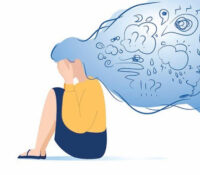Coping with anti-trans sentiment
Transgender people come from every region of the U.S. and around the world, from every racial and ethnic background, and from every faith community. There are about 1.4 million transgender adults in the U.S. alone — and millions more around the world, according to The National Center for Transgender Equality.
Across the U.S., segments of society continue amping up hateful rhetoric against the transgender community. Lawmakers are proposing – and passing —laws to restrict transgender people’s access to gender-affirming health care, public accommodations, like public restrooms and locker rooms, and restrict their participation in school activities, like athletics. They also work to curtail trans individuals’ rights to express themselves by pushing for bans on transgender books or to censor performances, like drag shows.
In April, the ACLU (American Civil Liberties Union) reported that it is tracking 467 anti-LGBTQ bills in the U.S.
“In the last few years, states have advanced a record number of bills that attack LGBTQ rights, especially transgender youth,” the organization dedicated to defending the right of all individuals stated on its website. “The ACLU is tracking these attacks and working with our national network of affiliates to support LGBTQ people everywhere.”
And the constant bombardment of anti-trans sentiment can have a devastating effect on the mental health of members of the trans community.
“Members of the trans community frequently have experienced lifelong trauma, and this can thus retraumatize them and kindle depression, anxiety and PTSD,” said Dr. Gagan Singh, Chief Medical Officer for Mercy Care, a local not-for-profit health plan offering integrated care to children, adults and seniors eligible for AHCCCS benefits. “Think about this as someone who cannot get away from a highly traumatic situation because someone keeps on coming an attacking and abusing them. That is highly disruptive psychologically.”
And it isn’t just a person’s mental health that suffers.
Dr. Singh notes that depression, anxiety and PTSD directly affect our physical health.
“People with these conditions have worse physical health outcomes than the general population,” he said. “The increased risk of developing depression, anxiety or PTSD is likely what drives this risk. In addition, for a subset of the population the repeated trauma might increase substance use risk which can also worsen physical health conditions.”
He offers some ways that members of the trans community can keep their minds and bodies healthy under such circumstances:
- Turn off the TV/social media feed to limit repeated exposure
- Find a community of support
- Eat right, sleep, exercise and stay away from drugs and alcohol
- Find meaning whether through advocacy or anything else that gives you joy and meaning in life
- Get help when things are getting out of hand
Did you know?
Transgender people are people whose gender identity is different from the gender they were thought to be at birth. “Trans” is often used as shorthand for transgender
What’s the difference between sexual orientation and gender identity?
Gender identity refers to your internal knowledge of your own gender—for example, your knowledge that you’re a man, a woman, or another gender. Sexual orientation has to do with whom you’re attracted to.
Why don’t transgender people get counseling to accept the gender they were assigned at birth?
Counseling aimed at changing someone’s gender identity, sometimes known as conversion therapy, doesn’t work and can be extremely harmful. It runs counter to the overwhelming consensus in the medical community. It can lead to lasting depression, substance abuse, self-hatred and even suicide.
What is gender dysphoria?
The medical diagnosis for someone who experiences serious emotional distress over the difference between the gender they are thought to be at birth and the gender they know themselves to be.
Why is transgender equality important?
Transgender people should be treated with the same dignity and respect as anyone else and be able to live, and be respected, according to their gender identity. But transgender people often face serious discrimination and mistreatment at work, school, and in their families and communities.
Did you know that transgender people are more likely to:
Be fired or denied a job
Face harassment and bullying at school
Become homeless or live in extreme poverty
Be evicted or denied housing or access to a shelter
Be denied access to critical medical care
Be incarcerated or targeted by law enforcement
Face abuse and violence
Source: National Center for Transgender Equality (www.transequality.org)
Stigma stymies health care
1 in 4 Reported issues with health insurance coverage, including the denial of medically necessary gender-affirming services, such as hormone therapy or transition-related surgeries.
1/3 Reported having at least one negative experience with a health care provider related to being transgender, such as verbal harassment or being refused treatment
1 in 5 Reported they did not see a doctor when they needed to because of fear of being mistreated as a transgender person.
Source: 2015 survey of adult transgender community members in the U.S. by National Center for Transgender Equality (www.transequality.org)



































